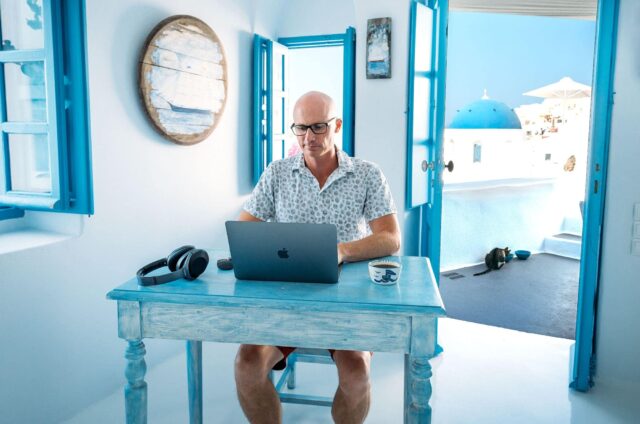Costa Rica will host digital nomads under a new tourist visa. This after a process that culminated in the signing of the Law to Attract International Remote Workers and Service Providers.
Who qualifies for this visa?
“Any foreign person that provides remote paid services, whether subordinate or not, using computers, telecoms or analog means for someone else who resides abroad and receives at least $3,000 in payments from abroad. In the case of a person requesting legal residency for his or her dependents, the amount is $4,000, according to the official exchange rate determined by the Central Bank of Costa Rica.” Payment must be received outside of Costa Rica.

What are the requirements for the digital nomad category?
- Fill out a request form. It must be signed by the tourist or their legal representative. It can be digitally accessed through the Trámite Ya platform. It can also be done physically by visiting an immigration office.
- Present a receipt of payment to the government for $100 or its equivalent in colons at the Central Bank of Costa Rica’s official exchange rate.
- A photocopy of the ID page of your passport and of the page with your most recent Costa Rica entry visa stamp. You must have your passport with you during this process.
- Consular visa for countries in the corresponding groups requiring consular visa. This also applies if you are in the country, according to the dispositions of the “general directions of visas of entry and permanence for non residents.”
- Bank statements accompanied by an affidavit stating that the statements have been requested and obtained from an accredited financial institution, or a certificate from a certified public accountant (CPA) or notary public (in the case it is done from Costa Rica). The certificate must be legalized at a consulate or apostilled.

All documents issued in a foreign language must be officially translated to Spanish. Informed consent document authorizing the Department of Immigration to hold information on applicants within their database. The Department of Immigration will also require a criminal background check through national or international databases. They may also conduct biometric reviews.
What documents must the family of those who accompany the digital nomad present?
- Marriage certificate valid for no more than six months.
- Document that shows the declaration or recognition of the joint relationship requested and valid for no greater than six months.
- Copy of the certificate of proof of birth in the case of minors or single people under 25.
- If the dependent is handicapped, a medical certificate must be presented showing the condition.
- Senior citizens must prove the existence of a connection or partnership with the person who is applying to the special stay through an affidavit.

All documents in foreign languages must be officially translated to Spanish. Document of informed consent authorizing the Department of Immigration to hold information on applicants within its databases.
What immigration channels can a person use to apply for a digital nomad visa?
Foreigners who wish to apply for the non-resident immigration category, subcategory “Remote Worker or Service Provider” must fill out an application and sign it, or have a legal guardian or representative sign it. It can be digitally accessed through Immigration’s Trámite Ya or requested in person by visiting an immigration office.
Can someone apply for the digital nomad visa from their country of origin?
You can apply both ways. If the tourist is in his country of origin, he or she can apply digitally on the Tramite Ya platform. Once their application is approved they can travel to Costa Rica. They can also arrive in Costa Rica, or if they arrived under a different category and wish to switch to digital nomad, they can do it here electronically or in person.
What are the tax and other incentives for digital nomads?
Under no circumstance will digital nomads be considered permanent residents in the country for tax purposes, nor will their revenue stream from abroad be considered a Costa Rican source of income, so they are exempt from paying Costa Rican income taxes and import duties on basic personal equipment such as a cell phone, tablet, camera and recording equipment.

For objects not specified in the law that nomads want to bring, they must go through a parallel process via an electronic platform at the Finance Ministry called EXONET. It will allow applicants to file requests for tax exemptions. Other benefits include permission to use a driver’s license from the country of origin for the duration of your stay.
Who is authorized to do the translations of the documents to spanish?
For the security of the applicant, translation can be done by an official translator at the Ministry of Foreign Affairs in Costa Rica or by a notary public with knowledge of the language. It can also be translated abroad, but it is best to have it done by a Costa Rican translator to avoid mistakes or issues with the translation.
What about the medical insurance requirement for digital nomads?
The medical insurance must cover nomads for their entire stay in Costa Rica and cover expenses up to $50,000. The policy can be international or from a local insurer that is regulated by Costa Rica’s General Insurance Regulator (Sugese). If the nomad brings dependents, each one of them must also be insured.

For those who have experienced shifts in consciousness and know that more peace, joy, and love awaits in a better living environment. A bold shared vision. A living community and hub for innovation. A sustainable ecosystem for living and working. A model for the new future.
